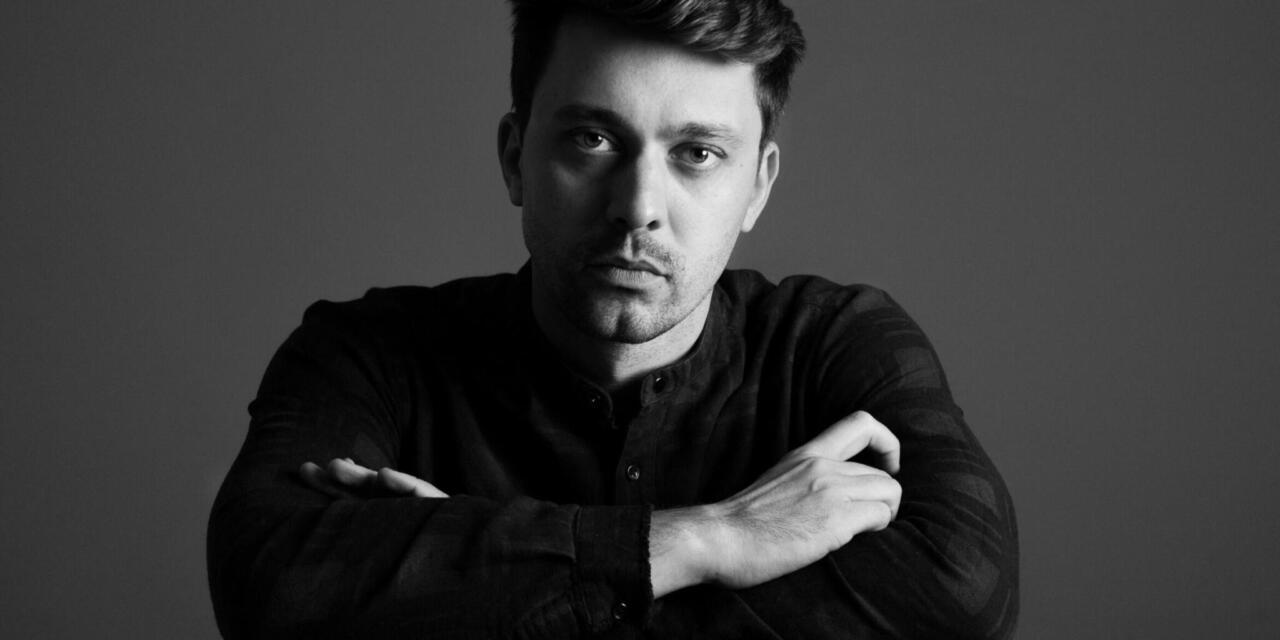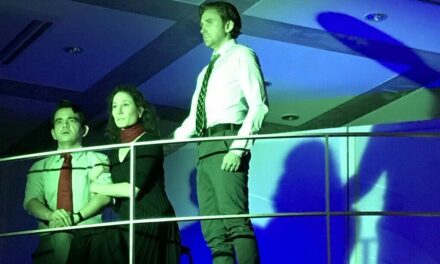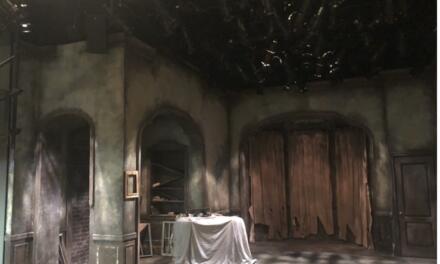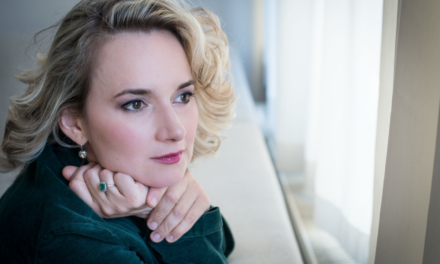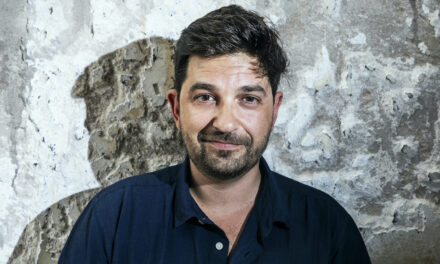During the very agonic and snail-slow, first foggy year under COVID of 2020, I met theater director Andrei Majeri, one of the most interesting and inspiring theatre people, at JoakimInterFest, Kragujevac.
Andrei Majeri (born 1990) is a Romanian theatre director. He completed his bachelor’s degree (2012), master’s degree (2014), and Ph.D. (2021) at Babeş-Bolyai University in Cluj-Napoca. He is currently living in Bucharest, where he stages most of his shows, as well as in other cities in Romania. Andrei Majeri is interested in contemporary play dramaturgy, mostly Romanian or Spanish, but he has also worked on texts written by classical playwrights such as Euripides, or canonical ones, such as Federico García Lorca, Witold Gombrowicz or Lucian Blaga. His shows include titles such as F.G. Lorca’s The Blood Wedding, Medea’s Boys after Euripide, Lucian Blaga’s Master Builder Manole, Ernesto Anaya (contemporary Mexican playwright)’s Las Meninas, and three of Rodrigo García’s most provocative texts: Agamemnon, Death and Reincarnation as a Cowboy and Human Gardening. Most of Andrei Măjeri’s shows bring up Greek tragedy, war, artist’s condition, migration, sexuality, and strong female characters. His directing style includes different types of transgression, controversial cutouts, bizarre characters, humor, sudden changes in convention and a fast pace of action. In 2019 he went on a big tour with Medea’s Boys (TESZT, FITS, FITO, Desire Subotica, MOT Skopje, JoakimInterFest Kragujevac, Undercloud, FDR). Andrei Măjeri is also an emerging playwright. His Dingo Dogs has been recently translated in English, and Amplexus has already been staged in his own direction.
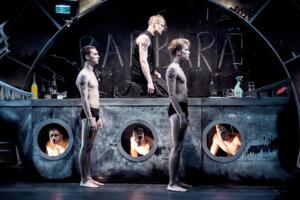
Medea’s Boys. Photo by Claudiu Popescu.
Ivanka Apostolova Baskar: Andrei, how did you manage to maintain your creativity and artistry in the past period of COVID, even before the war in Ukraine started?
Andrei Majeri: First of all, I want to thank you for the opportunity of having this discussion. I was very lucky during the pandemic, staying mostly at my parent‘s home, in South-East Romania. There I could focus on finishing my Ph.D., on the topic of theatricality in social groups unaware of the theatre phenomenon. Also, in 2020 I directed three new shows and in 2021 one more (Human Gardening). So, working was the tool of not losing my artistic rhythm. Also, I read a lot of books and worked in my garden, had zoom rehearsals, and participated in workshops online.
IAB: You are one of the freshest, most specific, and most productive contemporary theater directors in Romania, today, which in recent years is gaining regional recognition. You started your career directing in most of the beautiful and versatile, independent, and city theaters (in styles and programming) in Bucharest, Baia-Mare, Turda, Cluj-Napoca? With which play did you open all your next theater performances, and how and why?
AM: I started working in 2014, and since then I directed usually 2-3 shows a year. I was lucky to work with some of the best actors and I have been able to test my skills and grow in safe environments. I worked mostly in state theaters, but also in independent ones. For me, every play is a new opening, a risk. Sometimes I fail, sometimes the place is not the best and the producer does not take care of the show, etc. My first professional production was in the National Theatre of Cluj, with the play Pandora‘s Box by Katalin Thuroczy, a black comedy. I was invited there by my teacher and great director Mihai Măniuțiu. After that, I directed there three other shows.
IAB: Your projects after being staged in the theaters in Bucharest, you started directing in quality theaters throughout Romania, in Cluj-Napoca, Craiova, (also in Hungarian speaking theaters, in the Jewish Theatre in Bucharest, etc.) … Romania is an unusually rich and beautiful country with magnificent remnants of Austro-Hungarian culture, Ottoman culture, Romania under Communism – the phantom of Ceausescu; with vibrant contemporary and ethno-culture of Romanians, Hungarians, Vlachs, Roma people, Ukrainian, Turks … How do the present and the history of cultures influence your dramatic work?
AM: I always try to remain focused on the present changes, while researching the past. I search for equilibrium. As artists, we are like melting pots, we must be influenced by the realities that shaped our communities and also try to stay focused on the relevance of our art in the nowadays society. Having studied in Cluj-Napoca, with its rich Austro-Hungarian history, I felt it gave me the great chance to grow in an environment of interference, which is always good for a young artist. Being able to see theatre in Romanian and Hungarian, to work with colleagues in both languages helped me a lot.
IAB: Could you introduce us to the theater system in Romania? What are the rules of the game, the financing; conditions for theater work? Where to start as a director from the younger generation, and where/how to continue and maintain?
AM: The Romanian theater system is quite complex. We have more than 45 state theaters in the country, subsidized by the state budget, and also 10-15 independent theaters that usually apply for state funding or other sources of income. In state theaters you have better infrastructure and more employees in every sector, but as a director, you have to work with the hired actors there. In Romania, the system is a repertoire one, so the plays run as much as they bring public, in parallel with other ones. It is a hard job, especially for the actors; that must change quickly from day to day, sometimes in the same day, to play very different shows.
As a young director, I was lucky to win most of the national directors‘ debut contests (in Bucharest, Craiova, and Cluj) and so I was able to work in big institutions, with ok budgets and very good actors. Some start from the independent milieu, but my path was the opposite. Maybe, in the independent environment, you are able to experiment more in the first years, but I would not say that in the state one it is impossible. It is not, and changes must be done everywhere, especially where it lacks a new vibe. Of course, as we know, the margins/peripheries are always more alive than the center. My next goal is to work more and more abroad I just had a premiere in Serbia, in Novi Sad, and to have an agent.
IAB: What are the actors/actresses like in Romania, how do you approach the work of all the great star – actors/actresses and those from the so-called B class of actors (emerging and rising actors and actresses)? What are the similarities and differences in the mentality of establishments in theater(s) versus newcomers? What kind of acting talents do you face and how do you creatively deal with them?
AM: Usually, the actors I worked with were very open to provocations, research, and risks. I search for those that are also friendly towards their colleagues. As years passed, I learned how to work more peacefully, avoid conflict, etc. I collaborated with the top actors of our country, including Maia Morgenstern, Sorin Leoveanu, Natașa Raab, Miriam Cuibus, etc. Also, some of the best emerging artists had their debut in my shows. I see no difference in working with both groups if their artistic spirit is still searching. I work a lot with the I DONT KNOW idea in my head. Those that already know how things must be done are material I cannot deal with.
IAB: Why are you focused on tragedies (modern, classical and ancient)? What do these dramatic contents opens-allow you to do?
AM: I think I am attracted to adaptations of tragic subjects because one of my favorite themes is FAMILY, and the family topic is the basis of all those big conflicts we know from tragedies. I am also very interested in the phenomenon of the chorus, the ensemble, the common body, something I researched extensively in my PhD. During conflictual periods I often think that tragedies are the best examples of texts to be put on stage. They are like old olive trees that still bear fruit after so many years. They are a miracle. A miracle that I try to recreate on stage, with nowadays means.
IAB: Toward your methodologies in directing, why focus on self-contradiction, delirium versus logic, breaking the established processes in theaters; and how do you break the potential boredom?
AM: Boredom hits us all eventually, especially when you work with very self-centered people, that do not listen to their colleagues, that only think of their character etc. Then I know I have to protect myself, be scarce with sharing my philosophy because those people are not interested in sharing, which for me is an essential condition of the theatre. It did not happen to me so often, but sometimes I make mistakes in casting and have to deal with that. The show itself is the big priority, of course.
IAB: On April 15.2022, was the premiere of your last theater production Blind Spot (based on ancient Greek tragedies Bakhe, King Oedipus and Antigone, produced in collaboration with Serbian National Theater in Novi Sad, Vojvodina, during the prestigious European Capital of Culture – Novi Sad. Why compilation of old-time tragedies today in one of the most European cities on the ex Yugoslavian part of the Balkan?
AM: I think it is a time (after the pandemic, during a gruesome war) to remember those stories that shaped European culture. Serbia seemed open to such a proposal, tragedies not being staged so often there. Our show is, of course, a hybrid, not a per se tragedy, but I think it puts in connection those topics with our society. The compilation itself is connected through the Labdacid family and the city of Thebes. The theme of brotherly killing, of bias towards women, seemed more alive than ever to me, and to be said now, there. So, Antigone, Oedipus, Iocasta, and all the other characters became a part of this modern rewriting.
IAB: How did you approach the Serbian actors and collaborators behind the scenes? How was your cooperation, and what was your methodology in front of a new collaborative challenge? And what kind of feedback did you encounter?
AM: Most of them were very open and kind. I think I am attracted to kindness and curiosity towards the artist near you. Being my first international project, I tried sometimes to step on my personal well-being for the good of the general energy of the group. It was hard to communicate in English for almost two months, but with the help of my Romanian Collaborators (Andrea Gavriliu – choreography, Adrian Balcău – set and costume design, Adrian Piciorea – Sound design) and my Serbian assistant (Milorad Savanovic) we made it. Also, working with children was hard, but at the same time rewarding (we have two little girls, that play little Antigone and little Ismene that are wonderful). I think the actors felt they were protected, and that we made what we promised, on a production level. Also, I will be very near the show and try to take it to many festivals. I am not interested that much in feedback, but only in feed-forward. So, I can only hope that the show will grow, and they will be good gardeners for what we worked together.
IAB: Andrei apropos the current (as pretentious as it is fascinating) wave of domination of female, women`s and feminist voices, themes, authors, and artists in the world, what happens to the female side, and perspectives in theaters, today in Romania?
AM: When I studied directing, 10 years ago, in a class of 10 students, there was only one woman. Now, in the last generations, they are a majority. I think we are ending male domination in art, which is great. More and more great female directors do wonderful shows in Romania. I would give you a name to watch: Adina Lazăr – she is a very strong artist, that I follow and admire. All eyes on her!
IAB: You complete your Ph.D. studies in theater, I guess an eloquent person like you has ambitions to enter the educational field of theater and performing arts? What are your plans in this very important field of perpetual knowledge transfer?
AM: Everybody is assuming that about me, but no, I do not desire to enter the academic environment in my country, yet. It is still perpetuating wrong methods of teaching, with a lot of bias, etc. For the moment, I am searching for my technics as a director, and maybe later I will also focus on teaching. When I will have a lot of experience and many things to share with the students.
IAB: What is happening now/today in Romania, how is the crisis felt in your country, in your city due to the war in Ukraine? What do you witness on the streets?
AM: Of course, people feel great pressure and try to help the migrants. We stay focused on the news. As artists, we also try to address these topics in our work, helping some artists from Ukraine and Russia that left their homes and also talking about war and politics more and more in our shows. Art must be political.
IAB: In these present, turbulent times in the world, what do you predict, intuitively?
AM: Tabula rasa. Is the only way. Know very well the past, then delete it. Let your dreams flow and invent the future! Art has that power.
Skopje/Bucharest, 2022
This post was written by the author in their personal capacity.The opinions expressed in this article are the author’s own and do not reflect the view of The Theatre Times, their staff or collaborators.
This post was written by Ivanka Apostolova Baskar.
The views expressed here belong to the author and do not necessarily reflect our views and opinions.

